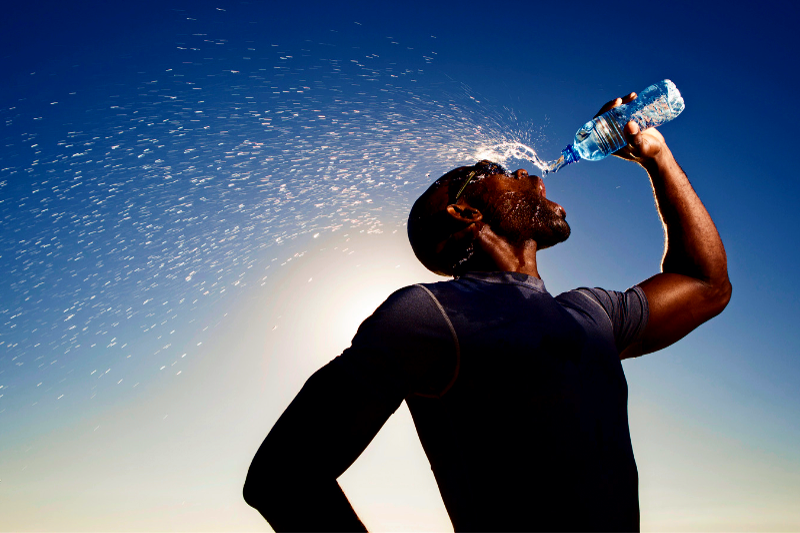Hydration is a crucial element of our daily lives, influencing our physical performance, cognitive function, and overall health. By maintaining hydration levels, we ensure that our body functions at its optimal capacity, supporting everything from digestion to the regulation of body temperature.
Water metabolism and absorption is a complex process that takes place within our bodies every time we consume water. This procedure involves various organs and systems, working together to ensure our cells receive the hydration they need to function correctly.
The Process of Drinking Water
When you take a sip of water, the journey begins. The water travels down the esophagus and lands in the stomach. This immediate response prepares the body for the digestion and absorption process.
In the stomach, water begins to mix with gastric secretions, facilitating the digestion of food. It then moves to the small intestine, where the majority of absorption takes place. The intestinal walls, lined with villi, absorb water and other essential nutrients, transferring them into the bloodstream.
The kidneys play an essential role in maintaining our body's water balance. They filter our blood up to 60 times a day, removing toxins and excess substances. They also adjust the amount of water reabsorbed into the body or expelled as urine, thus regulating our body's hydration status.
How Long Does Water Stay in the Body?
Water typically doesn't stay long in the stomach. After we drink, water enters the stomach, where it begins its journey through the digestive system. However, it doesn't linger here for long. Depending on various factors such as the presence of food—since a full stomach slows down the emptying process—and the individual's metabolic rate, water can leave the stomach and enter the small intestine as quickly as 5 minutes after drinking. However, this rate can extend up to 2 hours if the stomach is full of food, demonstrating how varied this process can be.
Following the stomach, water finds its way into the small intestine for water absorption. Here, the efficiency of the process is astounding. The small intestine is lined with millions of small finger-like projections called villi and even smaller projections called microvilli. This intricate structure drastically increases the surface area for absorption. Thanks to this extensive network, the small intestine can absorb a large volume of water—around 95%—in just 2 to 3 hours. This rapid absorption rate ensures that water quickly enters the bloodstream, ready to hydrate the body.
Once absorbed into the bloodstream, water swiftly reaches cells and tissues, hydrating and nourishing them. The cardiovascular system acts as a rapid transport system, distributing water to all parts of the body. Depending on the body's hydration status and the circulatory system's efficiency, this process can take as little as 5-10 minutes for the water to start reaching the cells after absorption from the small intestine.
However, distributing water to trillions of cells in the body isn't an instantaneous process. While the first cells can start receiving water within minutes, it might take a couple of hours for the water to be fully integrated and utilized by all the cells throughout the body.
This journey of water from the mouth to the cells is fascinating and dynamic. It's worth noting that the timing can vary greatly based on several factors. These include individual physiology (such as metabolism and organ function), activity level (since physical activity speeds up metabolism and increases water demand), and environmental conditions (for instance, hot weather can lead to increased sweating and a quicker need for hydration).
Furthermore, the body has an intricate system of checks and balances, known as homeostasis, to ensure that the right amount of water is retained for proper body function. When there's excessive water, kidneys filter it out for excretion. When there's not enough, various mechanisms, like the sensation of thirst and hormone regulation, kick in to conserve water and signal the need for increased water intake.
Factors Influencing Water Absorption
The human body's ability to absorb water is influenced by numerous factors, including hydration status, physical activity, climate, and personal characteristics such as age, gender, and overall health.
Hydration status serves as a determinant of water absorption speed. When the body is in a dehydrated state, it absorbs water more rapidly in an attempt to replenish depleted fluid levels. Conversely, a body that is adequately hydrated will slow down the rate of water absorption as there is no pressing need for additional water intake.
Physical exertion and climate can significantly influence the pace of water absorption. During strenuous workouts or in extremely hot weather, the body tends to sweat more, resulting in a higher fluid loss. To balance this increased demand for water, the body will speed up the water absorption process. This adjustment ensures that essential body functions remain optimally supported even under stress.
Individual characteristics, including age, gender, and overall health status, also impact water absorption. As people age, the total water content in their bodies gradually decreases. Additionally, kidney function, which plays a central role in water regulation, often declines over time. Both these factors can affect how the body manages water intake and absorption. Moreover, various health conditions can disrupt the body's fluid balance, potentially altering the water absorption rate.
The Role of the Kidneys in Water Regulation
The kidneys play a pivotal role in managing the body's water levels and regulating its fluid balance.
Their primary function involves filtering blood, removing excess water and waste products to form urine. Simultaneously, they reabsorb the necessary amounts of water back into the bloodstream, ensuring the body's water content remains in balance. This process is critical in maintaining optimal bodily functions and overall health.
The kidneys' efficiency is typically demonstrated by the time taken to produce urine after water consumption. It usually takes about 45 minutes to 2 hours for the kidneys to filter the ingested water and produce urine. However, this time frame can vary depending on several factors. These include the person's hydration status, kidney function, and individual physiology. These complexities underscore the kidneys' essential role in water regulation and the importance of maintaining their health for optimal hydration.
Hydration Recommendations
Determining the precise amount of water a person should consume daily can be complex, as it depends on a myriad of individual factors. However, a commonly accepted guideline is that an adult should aim to drink at least 2 liters or half a gallon of water per day. This recommendation is based on average needs, but individual hydration requirements can vary greatly.
Factors such as age, sex, and weight can influence the amount of water an individual needs. For example, men typically require more water than women due to their generally larger body mass, and an active, muscular person may need more water than someone who is less physically active. Physical activity levels also greatly influence hydration needs, as we lose more water through sweat during exercise.
In addition, the climate can significantly impact how much water a person should drink. Living or working in hot or dry conditions can cause the body to lose water more quickly, increasing the need for hydration. Conversely, cooler climates might require less hydration, although it's still essential to drink regularly.
In addition to plain water, consuming beverages and foods with high water content contributes to overall hydration. Moreover, electrolyte supplements, such as Key Nutrients Electrolyte Recovery Plus can enhance hydration. This supplement contains essential minerals, like sodium, potassium, and magnesium, which help retain water, balance body fluids, and support muscle function. Particularly during intense physical activity or recovery, these supplements can aid in replenishing lost electrolytes and maintaining optimal hydration.
Recognizing the signs of both dehydration and overhydration is equally crucial. Dehydration symptoms can range from mild, such as thirst and dry mouth, to severe, including fatigue, dizziness, and dark urine. This state indicates that the body is losing more water than it's taking in, which can have serious health consequences if not addressed promptly.
On the other hand, overhydration, or hyponatremia, occurs when excess water dilutes the sodium in your body, disrupting the balance of electrolytes. Symptoms can include headache, nausea, confusion, and in severe cases, seizures or coma.
Maintaining proper hydration is a delicate balance. It's not just about drinking as much water as possible, but rather ensuring that the body has just the right amount it needs to function optimally. Using aids like Key Nutrients Electrolyte Recovery Plus can help maintain this balance, especially during conditions of increased demand like exercise or recovery.
Conclusion
Water's journey through the human body is a testament to the complexity and efficiency of our physiological systems. From the instant we take a refreshing sip, a multitude of mechanisms spring into action. Water leaves our stomachs, travels through the labyrinthine network of our small intestines, and is finally absorbed into the bloodstream - all within a matter of hours. This process is not only impressively quick, but it's also incredibly efficient, with about 95% of consumed water being absorbed for use in the body. The kidneys play a critical role in this system, filtering water along with other substances from our bloodstream and excreting them as urine.
Understanding this intricate and vital process helps underscore the importance of maintaining proper hydration. Our bodies rely heavily on water for countless functions, from flushing out toxins and waste to supporting metabolism and digestion. Our hydration status can significantly influence our overall health, affecting our physical performance, cognitive function, and even mood. Recognizing the factors that impact water absorption—such as our hydration status, physical activity level, and individual health circumstances—allows us to make informed decisions about our water intake. By doing so, we can support our bodies' needs effectively and enhance our well-being.
Whether you're an athlete, a desk-bound worker, or someone managing health conditions, understanding the journey of water through your body can empower you to better take care of yourself. So here's to raising a glass of water - a simple act with profound effects on our health and vitality.




